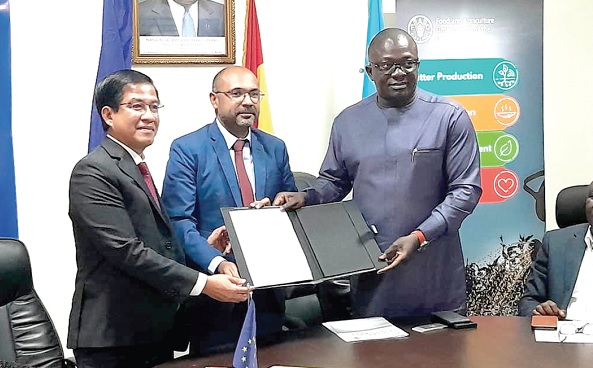
€10m Food security project launched
A project to boost food security in the north has been launched in Accra.
Dubbed “EU Food Security Response in Northern Ghana”, the €10 million project would support about 50,000 farmers over the next three agricultural seasons to increase crop and livestock production.
It also intends to increase maize yields to 18,000 metric tonnes millet, 5,184 metric tonnes, and sorghum to 8,517 metric tonnes.
In addition, capacity of beneficiary farmers, including women and other value chain actors, would be built to support them in their activities.
It is also expected to enhance farmers’ capacity on climate change adaptation, market access and financial services, and communication on pests and diseases for animals and crops.
The project, which is being funded by the EU, was launched by the Ministry of Food and Agriculture and the Food and Agriculture Organisation (FAO).
The three establishments signed an agreement to mark the commencement of the project last Monday.
Partnership
The Minister of Food and Agriculture, Dr Bryan Acheampong, described the project as a testament of the strong partnership between the government, the EU and the FAO.
“The COVID-19 pandemic, the Russia-Ukraine war, climate change and other factors have compounded the situation of many households who struggle to access adequate and nutritious food.
“For example, we used to import fertiliser from Ukraine and Russia at $500 a metric ton, but it has moved up to over a $1,000 since the crisis began,” he said.
The minister said as part of measures to address the challenges, the government had launched the second phase of its Planting for Food and Jobs (PFJ) initiative.
Farm to fork strategy
The FAO Representative to Ghana, Yurdi Yasmi, said the project was in line with the PFJ, adding that “this support is closely aligned to the EU’s ‘Farm to Fork Strategy’ aimed at ensuring food supply and food security in times of crisis with sufficient and varied supply of safe, nutritious, affordable and sustainable food to citizens at all times”.
He said the recently published report by FAO and other UN partners on the state of global food security and nutrition showed that the world was not on track in its efforts to end hunger, food insecurity and malnutrition in all its forms.
“The report emphasises the urgent need for agrifood systems to be transformed to become more resilient and deliver lower-cost nutritious foods and affordable healthy diets for all, sustainably and inclusively.
“Addressing these challenges require concerted efforts from all of us — the private sector, farmer-based organisations, NGOs, the government, international organisations and other key stakeholders to work together, complement each other’s efforts with well-tailored policies and interventions that promote food security, improved nutrition and also support sustainable agricultural development,” he added.
For his part, the EU Ambassador to Ghana, Irchad Razaaly, said the funding had been mobilised in record time and represented the commitment and solidarity of the EU and its member states in the face of the rising cost of food.
“These efforts complement the government’s initiatives to mitigate the adverse impact of rising food, fertiliser and fuel prices in vulnerable areas to help alleviate poverty, hunger and malnutrition.
